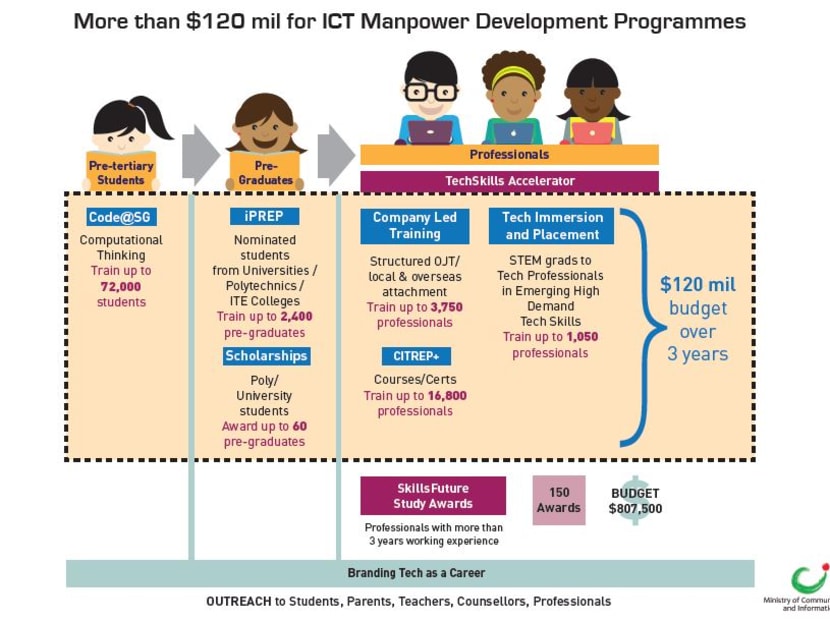S$120m fund to ready S’pore talents for ICT jobs boom
With the information and communications technology (ICT) sector expected to bring about a rash of opportunities in the coming few years — to the tune of 30,000 new jobs by 2020 — the Government on Monday (April 11) unveiled a S$120 million kitty to grow the pool of homegrown talents over the next three years, especially in software development, data analytics and cybersecurity.
SINGAPORE — With the information and communications technology (ICT) sector expected to bring about a rash of opportunities in the coming few years — to the tune of 30,000 new jobs by 2020 — the Government on Monday (April 11) unveiled a S$120 million kitty to grow the pool of homegrown talents over the next three years, especially in software development, data analytics and cybersecurity.
The plans, announced by Minister for Communications and Information Yaacob Ibrahim on Monday, span the breadth of talent sources: From nudging infocomm students to build a career in the sector instead of heading off into other industries, to giving existing professionals a leg-up in building up their domain expertise and wooing mid-career switchers to plump for a fresh start in the ICT field.
Speaking during the debate on the Ministry of Communications and Information’s (MCI) budget, Dr Yaacob said: “We must do our best to support our Singaporeans to be highly skilled so that they can compete with global talent.”
This starts from children when they are still young, he added.
To that end, the Code@SG programme, which teaches primary school students coding and computational thinking skills, will be extended to 24,000 students per year, up from the current 22,000.
As for those who are already studying infocomm disciplines, his ministry aims to focus on tackling leakage. A “significant proportion” of the 6,000 or so in each cohort head into other sectors upon graduation, possibly due to employers looking for applicants with strong experience, Dr Yaacob said.
To stem this, efforts will go into producing more “industry-ready talent” through expanding an existing programme that offers internship and mentorship opportunities to students, giving them the chance to get hands-on experience in actual projects and build their portfolios.
From about 130 per year, the Industry Preparation for Pre-Graduates Programme will be extended to 800 students per year, over the next three years — with the eventual goal to boost supply by 2,400 over three years.
“It is not enough to ensure that we have sufficient computing science or IT places in our institutes of higher learning (IHLs). We must also ensure that our students have work-ready skills, and our current workers in the sector can easily renew their skills,” said Dr Yaacob.
In terms of keeping existing professionals in the industry au fait with the newest skills, the MCI will accelerate professional development programmes.
The Company-Led Training programme, where structured training by industry partners is co-funded by the IDA, will be scaled up to train 900 new entrants to the industry over the next three years — last year, the figure was 160. In addition, mid-level professionals will also be eligible for the programme, which also features local and overseas training and attachments. The target is to train 350 of these mid-level professionals per year over the next three years, especially in emerging tech areas such as cybersecurity and analytics.
Separately, the Critical Infocomm Technology Resource Programme will also be expanded to include short courses on entry-level skills, culminating in certifications. About 5,600 a year over the next three years are expected to benefit, up from 3,000 a year.
And to woo mid-career switchers to the infocomm sector, the capacity for Tech Immersion and Placement programmes will be ramped up, with the aim to reach more than 1,000 trainees over the next three years, especially those with Science, Technology, Engineering and Math backgrounds. These programmes comprise boot camps that provide short but immersive training for people with no background or industry experience in tech, but who have interest in a tech career.
Lastly, the TechSkills Accelerator, which was announced in Finance Minister Heng Swee Keat’s Budget speech, will be anchored by major employers in the sector, including the new Government Technology Agency, Singtel, Mediacorp, and ST Electronics.
Dr Yaacob also spoke about the MCI’s push to grow the media sector on Monday.
For instance, Creators’ Space, a meeting space for digital content creators to experiment and collaborate, is slated to open by end of this year at Pixel Building in one-north – with key partners such as Adobe, digital creative agency Brand New Media, online video platform Dailymotion and Disney’s Maker Studios on board.
Co-located in the Creators’ Space will be Story Lab — an initiative geared towards develop compelling story ideas, and innovative ways to tell these stories across various media platforms. In addition, the Games Solution Centre will also offer budding game developers mentorship programmes, support for them to take their businesses and ideas overseas, as well as business networking and access to financing opportunities.







